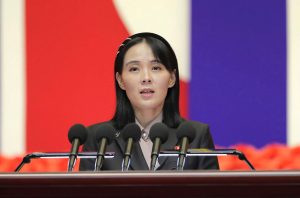Kim Yo Jong, the powerful sister of North Korean leader Kim Jong Un and the regime’s main voice on inter-Korean relations, said Pyongyang has “no interest” in restoring inter-Korean relations even under the new government of Lee Jae-myung, the liberal icon who assumed office on June 4 in the wake of Yoon Suk-yeol’s illegitimate declaration of martial law.
“We clarify once again the official stand that no matter what policy is adopted and whatever proposal is made in Seoul, we have no interest in it and there is neither the reason to meet nor the issue to be discussed with the ROK,” Kim said in the statement published on July 28 by the North’s state-controlled Korean Central News Agency on Monday. (ROK is an acronym of South Korea’s official name: Republic of Korea.)
Days after Lee took the presidency, he ordered the military to halt loudspeaker broadcasts near the inter-Korean border. After that, North Korea also halted such broadcasts, which many observers and government officials in Seoul saw as Pyongyang’s friendly response to the South’s goodwill. However, Kim Yo Jong downplayed that analysis. According to her statement, South Korea should have not resumed the loudspeaker broadcasts in the first place, so stopping such activities is not “worthy of appreciation.”
“If the ROK, which had stoked the atmosphere of extreme confrontation in the past after unilaterally declaring the DPRK as its principal enemy, expected that it could reverse all the results it had made with a few sentimental words, nothing is [a] more serious miscalculation,” Kim said. (DPRK is an acronym of North Korea’s official name: the Democratic People’s Republic of Korea.)
Kim also mentioned Lee’s denunciation of his predecessor’s ceaseless moves to aggravate unnecessary tensions on the Korean Peninsula. However, she pointed out that the lesson Pyongyang has learned in the past few years is that no South Korean president can make sincere moves to bring peace on the Korean Peninsula. Kim once again denounced Seoul’s ties with Washington and the extensive joint military drills between South Korea and the United States, and blamed them for the deteriorating situation on the Korean Peninsula.
“No matter how desperately the Lee Jae Myung government tries to imitate the fellow countrymen and pretend they do all sorts of righteous things to attract our attention and receive international attention, there can be no change in our state’s understanding of the enemy,” Kim said. She added that Lee’s administration “can not turn back the hands of the clock of the history which has radically changed the character of the DPRK-ROK relations.”
Through Kim’s statement, Pyongyang has clearly ruled out the possibility of working with Seoul to make progress on inter-Korean relations. That stance is in line with Pyongyang’s policies on nuclear weapons in the past years, especially after the breakdown of the North Korea-U.S. summit in Hanoi, and its decision to officially abandon the goal of reunification last year.
South Korean Unification Minister Chung Dong-young said on Monday that he will suggest that Lee halt the bilateral military drills with the United States.
During his confirmation hearing two weeks ago, Chung also implied that it is time to reset the Unification Ministry’s approach to North Korea. He admitted that working with Pyongyang to reunify the two Koreas is de facto an unrealistic goal.
However, it is uncertain how South Korea can carry out a new updated approach on North Korea while its Constitution clearly stipulates that “the territory of the Republic of Korea shall consist of the Korean Peninsula and its adjacent islands.” There needs to be a broader consultation with the public to decide how to build fruitful relations with North Korea should Seoul withdraw its conventional ambition of reunification.

































